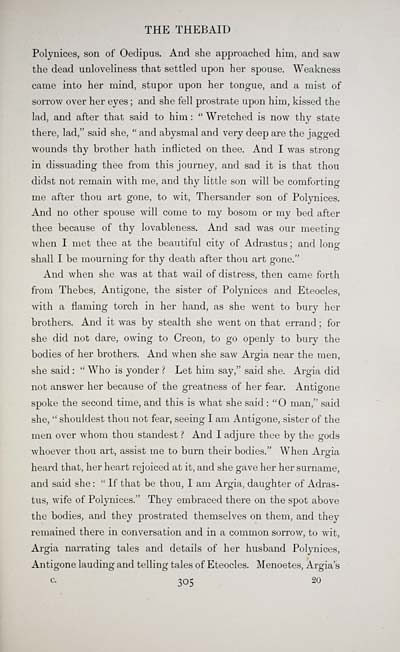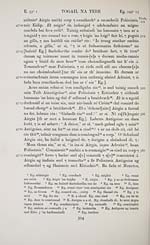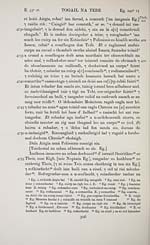Matheson Collection > Togail na Tebe
(333)
Download files
Complete book:
Individual page:
Thumbnail gallery: Grid view | List view

THE THEBAID
Polynices, son of Oedipus. And she approached him, and saw
the dead unloveliness that settled upon her spouse. Weakness
came into her mind, stupor upon her tongue, and a mist of
sorrow over her eyes ; and she fell prostrate upon him, kissed the
lad, and after that said to him : " Wretched is now thy state
there, lad," said she, " and abysmal and very deep are the jagged
wounds thy brother hath inflicted on thee. And I was strong
in dissuading thee from this journey, and sad it is that thou
didst not remain with me, and thy little son will be comforting
me after thou art gone, to wit, Thersander son of Polynices.
And no other spouse will come to my bosom or my bed after
thee because of thy lovableness. And sad was our meeting
when I met thee at the beautiful city of Adrastus ; and long
shall I be mourning for thy death after thou art gone."
And when she was at that wail of distress, then came forth
from Thebes, Antigone, the sister of Polynices and Eteocles,
with a flaming torch in her hand, as she went to bury her
brothers. And it was by stealth she went on that errand ; for
she did not dare, owing to Creon, to go openly to bury the
bodies of her brothers. And when she saw Argia near the men,
she said : " Who is yonder ? Let him say," said she. Argia did
not answer her because of the greatness of her fear. Antigone
spoke the second time, and this is what she said : "O man," said
she, " shouldest thou not fear, seeing I am Antigone, sister of the
men over whom thou standest ? And I adjure thee by the gods
whoever thou art, assist me to burn their bodies." When Argia
heard that, her heart rejoiced at it, and she gave her her surname,
and said she : " If that be thou, I am Argia, daughter of Adras-
tus, wife of Polynices." They embraced there on the spot above
the bodies, and they prostrated themselves on them, and they
remained there in conversation and in a common sorrow, to wit,
Argia narrating tales and details of her husband Polynices,
Antigone lauding and telling tales of Eteocles. Menoetes, Argia's
c 305 20
Polynices, son of Oedipus. And she approached him, and saw
the dead unloveliness that settled upon her spouse. Weakness
came into her mind, stupor upon her tongue, and a mist of
sorrow over her eyes ; and she fell prostrate upon him, kissed the
lad, and after that said to him : " Wretched is now thy state
there, lad," said she, " and abysmal and very deep are the jagged
wounds thy brother hath inflicted on thee. And I was strong
in dissuading thee from this journey, and sad it is that thou
didst not remain with me, and thy little son will be comforting
me after thou art gone, to wit, Thersander son of Polynices.
And no other spouse will come to my bosom or my bed after
thee because of thy lovableness. And sad was our meeting
when I met thee at the beautiful city of Adrastus ; and long
shall I be mourning for thy death after thou art gone."
And when she was at that wail of distress, then came forth
from Thebes, Antigone, the sister of Polynices and Eteocles,
with a flaming torch in her hand, as she went to bury her
brothers. And it was by stealth she went on that errand ; for
she did not dare, owing to Creon, to go openly to bury the
bodies of her brothers. And when she saw Argia near the men,
she said : " Who is yonder ? Let him say," said she. Argia did
not answer her because of the greatness of her fear. Antigone
spoke the second time, and this is what she said : "O man," said
she, " shouldest thou not fear, seeing I am Antigone, sister of the
men over whom thou standest ? And I adjure thee by the gods
whoever thou art, assist me to burn their bodies." When Argia
heard that, her heart rejoiced at it, and she gave her her surname,
and said she : " If that be thou, I am Argia, daughter of Adras-
tus, wife of Polynices." They embraced there on the spot above
the bodies, and they prostrated themselves on them, and they
remained there in conversation and in a common sorrow, to wit,
Argia narrating tales and details of her husband Polynices,
Antigone lauding and telling tales of Eteocles. Menoetes, Argia's
c 305 20
Set display mode to: Large image | Transcription
Images and transcriptions on this page, including medium image downloads, may be used under the Creative Commons Attribution 4.0 International Licence unless otherwise stated. ![]()
| Early Gaelic Book Collections > Matheson Collection > Togail na Tebe > (333) |
|---|
| Permanent URL | https://digital.nls.uk/82254166 |
|---|
| Description | Items from a collection of 170 volumes relating to Gaelic matters. Mainly philological works in the Celtic and some non-Celtic languages. Some books extensively annotated by Angus Matheson, the first Professor of Celtic at Glasgow University. |
|---|
| Description | Selected items from five 'Special and Named Printed Collections'. Includes books in Gaelic and other Celtic languages, works about the Gaels, their languages, literature, culture and history. |
|---|

